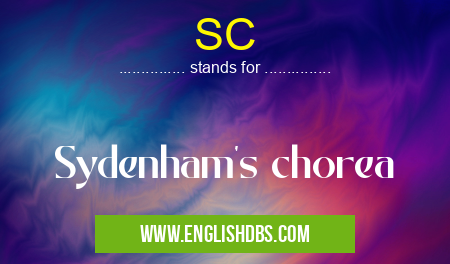What does SC mean in HOSPITALS
Sydenham's chorea (SC) is a childhood-onset neuropsychiatric disorder characterized by involuntary movements, emotional lability, and cognitive impairment. It is associated with streptococcal infections, typically following scarlet fever.

SC meaning in Hospitals in Medical
SC mostly used in an acronym Hospitals in Category Medical that means Sydenham's chorea
Shorthand: SC,
Full Form: Sydenham's chorea
For more information of "Sydenham's chorea", see the section below.
- SC stands for Sydenham's chorea, a childhood neurological disorder that affects the central nervous system.
- It is named after the English physician Thomas Sydenham, who first described the condition in the late 17th century.
Causes
- SC is primarily caused by an autoimmune reaction triggered by infection with Streptococcus pyogenes (group A streptococcus) bacteria.
- The body's immune system mistakenly attacks the basal ganglia, a brain region responsible for motor control.
Symptoms
- Involuntary and purposeless movements, such as writhing, facial grimacing, and limb jerking
- Speech difficulties (dysarthria)
- Gait disturbances (ataxia)
Diagnosis
- Diagnosis is based on physical examination, medical history, and laboratory tests, such as:
- Streptococcal serology
- Electrocardiogram (ECG)
- Neuroimaging (MRI or CT scan)
Treatment
- SC is typically treated with antibiotics to eliminate the streptococcal infection and reduce inflammation.
- Additional medications may be prescribed to control the involuntary movements, such as:
- Antipsychotics
- Dopamine antagonists
Prognosis
- Most children (around 80%) recover fully within a year.
- However, some may experience persistent symptoms or develop other complications, such as:
- Developmental delays
- Learning difficulties
- Obsessive-compulsive disorder
Essential Questions and Answers on Sydenham's chorea in "MEDICAL»HOSP"
What is Sydenham's chorea (SC)?
What causes SC?
SC is caused by an autoimmune reaction that occurs after a streptococcal infection. Antibodies produced by the body to fight the infection mistakenly attack the brain, specifically the basal ganglia, resulting in inflammation and the characteristic symptoms of SC.
What are the symptoms of SC?
The primary symptom of SC is involuntary movements, which can range from mild tics to severe, uncontrollable jerking. Other symptoms include emotional lability, with rapid mood swings and crying spells, as well as cognitive difficulties, such as impaired attention and memory.
How is SC diagnosed?
Diagnosis of SC is based on a combination of clinical symptoms, a history of recent streptococcal infection, and laboratory tests to detect antibodies against streptococcal antigens. Neurological examination and imaging studies, such as MRI, may be used to exclude other conditions.
What is the treatment for SC?
Treatment for SC focuses on managing symptoms. Antipsychotic medications, such as haloperidol or risperidone, are commonly used to control involuntary movements. Other medications, such as antidepressants or mood stabilizers, may be prescribed to address emotional symptoms. Physical therapy and occupational therapy can help improve mobility and coordination.
What is the prognosis for SC?
The prognosis for SC is generally good. Symptoms typically resolve within a few months to a year, although some individuals may experience long-term cognitive difficulties. Early diagnosis and treatment can improve outcomes.
Final Words:
- SC is a childhood neurological disorder caused by an autoimmune reaction to streptococcal infection.
- It is characterized by involuntary movements and other neurological symptoms.
- Diagnosis and treatment are crucial for improving outcomes and minimizing long-term complications.
SC also stands for: |
|
| All stands for SC |
